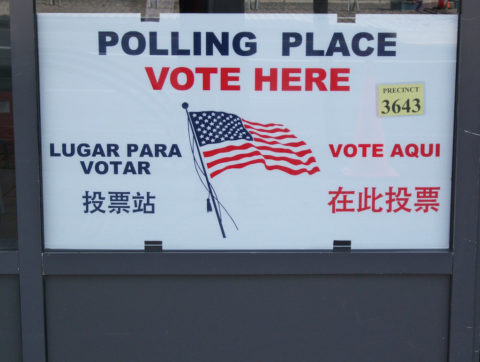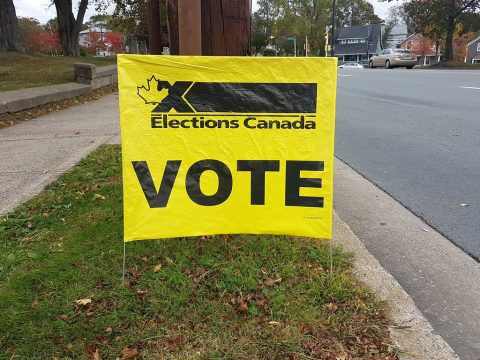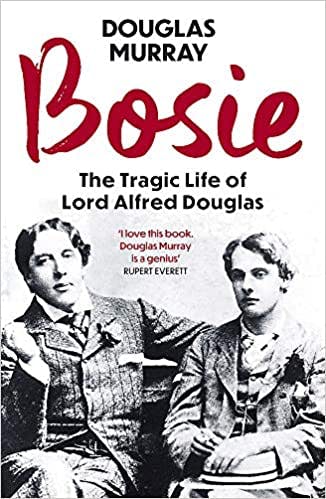Down south, our American neighbours held a federal election at the beginning of November. Ignoring the Associated Press trying to annoint the winner, we still don’t legally know who won and the tallies in several states are still being challenged. This is an embarassing situation for the “leaders of the free world” and common sense changes to the way the vote is conducted seem to be the best way to ensure that the results are known quickly and that the results will fairly represent the way the voters chose to exercise their franchise. At Steyn Online, Tal Bachman has a fairly concrete set of suggestions that would be a significant improvement over the system in place today:
First, it’s run by a single-purpose, rigorously impartial, devoutly transparent federal entity overseeing federal elections (about which more below).
Yes, I know we’re all sick of the federal Leviathan. I know it already has far too much power. It’s just that in this case, we don’t have much choice, do we? We’re going on well over a century of chronic Democrat Party presidential vote-rigging; and it appears they just ran one of their classic tricks again just a few weeks ago. At some point, pro-America voters have to stop making excuses for why they shouldn’t try solutions to these nation-destroying problems, and just try them.
Yes, I know this would require a constitutional amendment. But let’s assume for now we could get one of those passed.
Second: The new federal entity — let’s call it Elections USA — would then divide the nation into voting districts of equal size for purposes of federal election (that could occur within pre-existing congressional districts). Elections USA would then further subdivide the voting districts into smaller units. Working with the postal service, Elections USA would then draw up a list of voters in each unit, and designate a voting station for residents of that particular unit.
Third: In preparation for election day, Elections USA would send out flyers informing households of where to vote. The information would also be made available on the Elections USA website.
Fourth: On election day, voters travel to their designated voting stations: an elementary or high school, a union hall, a community center, whatever.
Each voting station is watched over by police or other security guards.
As voters approach, they join a quick-moving line. At the front, they present two pieces of government issued ID, at least one with a photo. A volunteer finds the voter on her list of voters for that unit. (If they’ve come to the wrong polling station, they are redirected to the right polling station).
The voter then approaches the voting station in a large, open room, where another volunteer hands him a paper ballot. Picking up the provided pencil, he marks the ballot behind a screen, folds the ballot, and drops into the voting box in full view of the poll clerk and attendant witnesses sitting a few feet away—typically, a few volunteers from political parties who act as “scrutineers”, or official observers and verifiers. The voter then leaves. The entire process never takes more than fifteen minutes.
Once polls close, no one is allowed to enter or leave the premises until the vote count is completed.
The poll clerk — still in full view of the scrutineers — dumps the ballots on to a table and sorts them into piles according to the candidate/party voted for. She then counts the votes for each, showing them to the scrutineers as she goes. Once the votes are counted, a supervisor is called over to the table. After verifying that the scrutineers are satisfied with the counting, and resolving any lingering concerns, the supervisor signs off on the count, and the ballots are immediately placed in a special, sealed envelope. The sealed envelope is then stamped, and cannot be opened without subsequent detection.
The ballot count numbers are then phoned into Elections USA, right then and there, again in view of the scrutineers, who verify that the numbers called in match the numbers they witnessed during the count.
Once all the numbers are called in to Elections USA — a process which never takes more than two hours — the supervisor then physically transports the sealed envelopes (each marked with information like Voting Desk #4 at Poll Station #15) to the Elections USA depot, where she hands them over.
The sealed envelopes are then transported to Elections USA employees, who will then verify, and eventually formally certify, that all the numbers called in from each desk of each polling station of each voting district in the country matches the number of actual ballots. In the unlikely event any question arises about accuracy, the ballots can be accessed and counted again.
In a simple process like this, the media will have accurate election results within two hours of the polls closing, and there is virtually no opportunity for fraud. I can attest to that, because I myself have witnessed this exact process in real life quite a few times, and am friendly with several people who volunteer as election workers on election days. What I described is how elections are conducted in Canada, but not only in Canada: an identical or similar process is used in most other English-speaking countries. A few simple security protocols — not least of which is, no computerized voting machines — and your election is as fraud-proof as this mortal realm would ever allow.
When you compare this typical voting procedure to the morass of conflicting voting regulations representing fifty states, many of which — incredibly — do not even require that the voter present identification before voting, and which are being manipulated by the very state party hacks tasked with preventing fraud, you begin to see just how desperately America needs electoral reform. Credible stories of poll watchers being denied access, for example, in any normal country, would be regarded as completely unacceptable, to the point where the votes in that area would be likely thrown out as a matter of course. And yet, that type of chicanery is now so common in the United States, most people take for granted it goes on. That’s how far the window of acceptable behavior has moved.
















